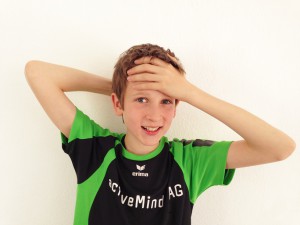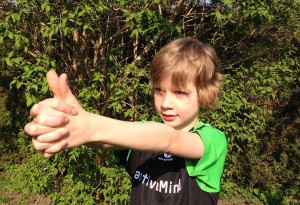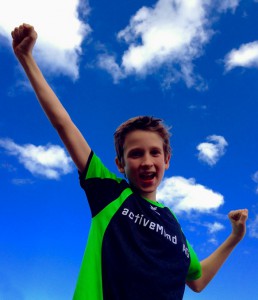Kinesiology in Sport – Find More Joy and Success in Sport
Kinesiology offers us various ways to live our life in an easier and happier way, sport kinesiology helps us to achieve more pleasure and success in sport by the elimination of blockades and stressors (that is what barriers and aggravations are called in kinesiology).
Not only do we need quick reactions and good technique for sport, we also need the ability to coordinate and focus ourselves. BrainGym exercises, that is what the kinesiological exercises are called, which are ideal as a preparatory warm-up for any kind of sport. These exercises have a tremendous potential: they help to improve the information flow between head and body, improving brain-muscle coordination, spatial awareness, binocular vision, and balance, just to name a few aspects.
 It’s common knowledge that humans have one right and one left brain hemisphere, but there is also a front and a rear part as well as an upper and a lower part. Kinesiological exercises enable us to address all these parts of our brain and thus have them interact in a more effective way. At the same time our brain dimensions are communicating with our body dimensions. If they are able to work together in an efficient way, this will result in improved performances (e.g. better spatial awareness, acoustic and optical signals will be processed in a faster and more effective way, intuitively correct and fast action, and many more). Furthermore, there are very interesting balance techniques especially profitable to sportsmen. Let me give you a quick example from sport kinesiology: Our muscles need to work together in a very coordinated way in order to keep us in the best possible balance. If we keep putting a little more weight on one foot than on the other, our body will get out of balance. Thus arm- and leg-lever will have to be readjusted constantly, while the synergist and the antagonist are continuously under strain resulting in weariness.
It’s common knowledge that humans have one right and one left brain hemisphere, but there is also a front and a rear part as well as an upper and a lower part. Kinesiological exercises enable us to address all these parts of our brain and thus have them interact in a more effective way. At the same time our brain dimensions are communicating with our body dimensions. If they are able to work together in an efficient way, this will result in improved performances (e.g. better spatial awareness, acoustic and optical signals will be processed in a faster and more effective way, intuitively correct and fast action, and many more). Furthermore, there are very interesting balance techniques especially profitable to sportsmen. Let me give you a quick example from sport kinesiology: Our muscles need to work together in a very coordinated way in order to keep us in the best possible balance. If we keep putting a little more weight on one foot than on the other, our body will get out of balance. Thus arm- and leg-lever will have to be readjusted constantly, while the synergist and the antagonist are continuously under strain resulting in weariness.
A foot thus overstrained can cause a chain reaction up to one’s neck muscles. In sport kinesiology, we test these very pairs of muscles in respect to their interaction and then correct the discovered imbalances by using a manual technique from Touch for Health.
Not only adults but also even young children have to deal with disparaging experiences, such as being laughed at loudly by teammates or seeing the exasperated trainer and/or grumbling parents if they fail. Maybe the problem is just your own disappointment about one’s own performance, the feeling of “not having been good enough”. Quite often – even as adults – we still suffer from exactly the defeats we experienced in our childhood. Not necessarily in our conscious minds but somewhere hidden deep inside us, these experiences still handicap us today. If we succeed in getting rid of the stress concerning our “you will never be successful in anything”-beliefs, we will be able to use our whole potential.
“You are your own limits, overcome them”
Schamsoddin Mohammad Hafes
I would love to assist you with sport kinesiology.




